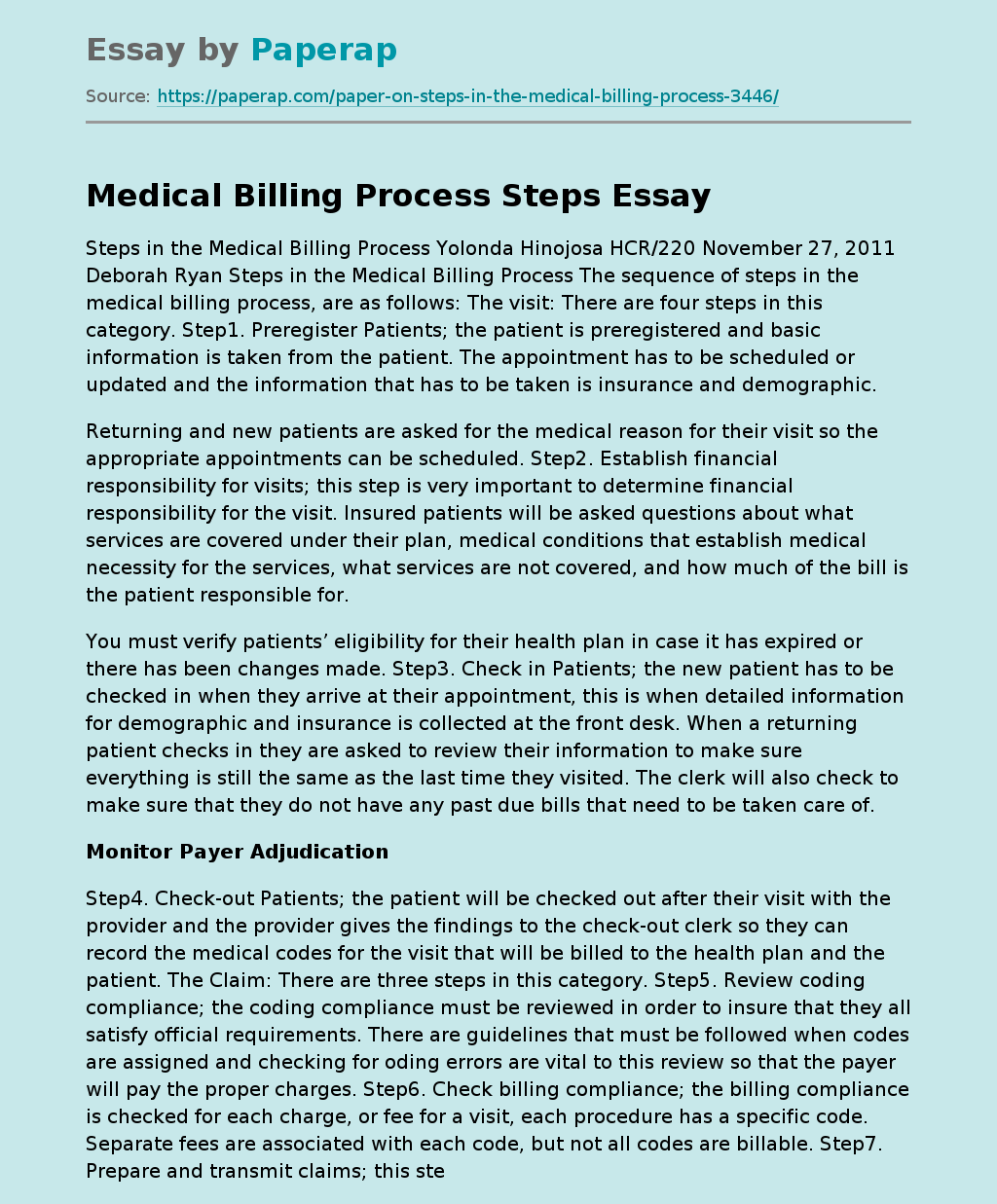Medical Billing Process Steps
Steps in the Medical Billing Process Yolonda Hinojosa HCR/220 November 27, 2011 Deborah Ryan Steps in the Medical Billing Process The sequence of steps in the medical billing process, are as follows: The visit: There are four steps in this category. Step1. Preregister Patients; the patient is preregistered and basic information is taken from the patient. The appointment has to be scheduled or updated and the information that has to be taken is insurance and demographic.
Returning and new patients are asked for the medical reason for their visit so the appropriate appointments can be scheduled.
Step2. Establish financial responsibility for visits; this step is very important to determine financial responsibility for the visit. Insured patients will be asked questions about what services are covered under their plan, medical conditions that establish medical necessity for the services, what services are not covered, and how much of the bill is the patient responsible for.
You must verify patients’ eligibility for their health plan in case it has expired or there has been changes made.
Step3. Check in Patients; the new patient has to be checked in when they arrive at their appointment, this is when detailed information for demographic and insurance is collected at the front desk. When a returning patient checks in they are asked to review their information to make sure everything is still the same as the last time they visited. The clerk will also check to make sure that they do not have any past due bills that need to be taken care of.
Monitor Payer Adjudication
Step4. Check-out Patients; the patient will be checked out after their visit with the provider and the provider gives the findings to the check-out clerk so they can record the medical codes for the visit that will be billed to the health plan and the patient. The Claim: There are three steps in this category. Step5. Review coding compliance; the coding compliance must be reviewed in order to insure that they all satisfy official requirements. There are guidelines that must be followed when codes are assigned and checking for oding errors are vital to this review so that the payer will pay the proper charges. Step6. Check billing compliance; the billing compliance is checked for each charge, or fee for a visit, each procedure has a specific code. Separate fees are associated with each code, but not all codes are billable. Step7. Prepare and transmit claims; this step is a major one for the medical billing process in order to assure that the preparation of accurate and timely claims. If this step is skipped then the provider cannot be paid for services rendered.
Post Claim: There are three steps in this category. Step8. Monitor payer adjudication; this should be done after claims have been sent to health plans because it is important to collect payment as soon as possible. These payments as well as those from patients are the practice’s accounts receivable and this money is used to run the practice. Step9. Generate Patient statements; the statements must be generated in order for the patient to know the amount they owe after their health plan and any other insurance has paid their portion of the bills.
Step10. Follow up patient payments and handle collections; following up patient payments and handling collections is also an important part of the medical billing process, it assures that the patient accounts are paid in a timely manner in order to keep them from going to collections. Patient payments are analyzed regularly for over-due bills. Reference Valerius, J. , Bayes, N. L. , Newby, C. , & Seggern, J. I. (2008). Medical Insurance an Integrated Claims Process Approach (3rd Ed. ). New York, NY: McGraw-Hill.
Medical Billing Process Steps. (2019, Dec 05). Retrieved from https://paperap.com/paper-on-steps-in-the-medical-billing-process-3446/

